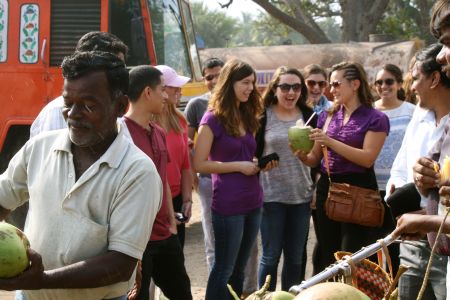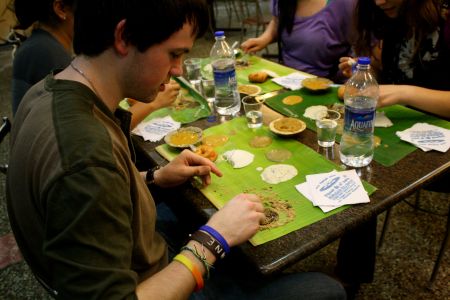by Casey Dollinger and Elizabeth Engele, Juniors in Supply Chain Management at the University of Illinois at Urbana-Champaign
The following post was written by students on an ADM Institute-sponsored observation study tour through India.

On the way to visit a village outside of Chennai, students refresh
with a coconut water break Credit: ADM Institute/Kari Wozniak
Food can create meaningful, memorable, and lasting experiences, and not just from eating it. During our ten days in India, we are tasting new cuisines, while simultaneously learning about the supply chains behind it. As supply chain management students, who also really love food, this is an incredible experience.
We began our observation of new foods and customs at breakfast on day one – the meal included chicken and vegetables. This is because, we learned, Indians eat the same type of meal for breakfast, lunch, and dinner. In America, we might find it distasteful to have pancakes for dinner or steak for breakfast. Our sharing and discussion of the meal sparked interesting conversation among the group and with our professor about Indian culture and practices.
Day two brought another food expedition when our tour guides stopped the bus for a quick coconut water break—everyone jumped at the opportunity. The coconut vendor shucked the coconuts from the branch on his cart and sliced them open, handing each of us our own. We were refreshed as we slurped the natural water, and surprised when we ate the pulp, its taste and unusual texture unfamiliar to our taste buds. We found it fascinating to observe the different quality levels of our pulp, as some had very fresh pulp, while others had dried out coconuts with hardly any pulp at all.
Our travels are not only about tasting these new foods, but also learning about the journey behind them. As supply chain management students, we think about the intricate and long processes involved in the production of goods. For agriculture, food is not just the basis of a simple meal, but also a product that goes through many processes to bring it to the table. For dinner one evening we dined at a popular local restaurant, Murugan Idli, where the common dish of idlis are served with several sides. Idlis, our professor explained while also telling us what the chutneys, pongals, sambhar, and other foods consist of, are made from rice. This is what we had spent that whole day learning about.

Students try typical south Indian cuisine in Chennai
Credit: ADM Institute/Kari Wozniak
We enjoyed the delicious meal, served on a banana leaf, while also discussing our observations from our day’s experience with local rice production. We had learned from farmers how long it takes to grow rice in the field—90 days—how it must be shucked, dried and polished, and what different types are marketed and sold. In observing the stages, we also learned how food is lost in the many steps involved in the supply chain, from transportation from the farm, to the mills, to the market, to the consumer. Every additional stage involved increases the possibility for loss to occur.
Trying new cuisines and considering how our food is produced has made this international journey extremely meaningful so far. We are expanding beyond our comfort zones (some had their first cup of coffee) and learning to cherish the Indian culture surrounding our emerging adventure. At the same time, we are learning about problems and issues we discuss in our classes at Illinois. On the remainder of our trip, we will travel to three more cities and several more sites, all the while finding it amazing that simple experiences like stopping at a roadside coconut stand can have such a lasting and memorable impact.
More about the trip:
- Illinois Students Gear up to Impact Global Food Security
- Following the Flowers: A First Look at Indian Supply Chains
- Losses Along the Way
Edited by: K. Wozniak and G. Kenney


No comments yet.